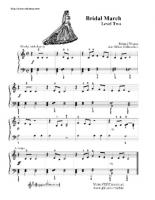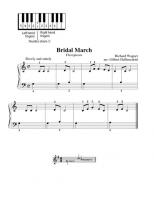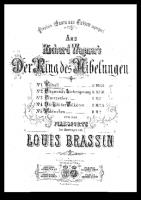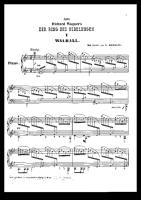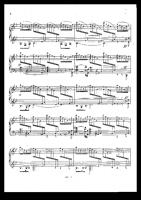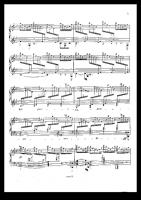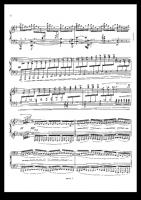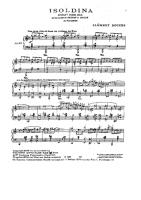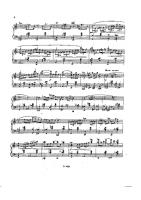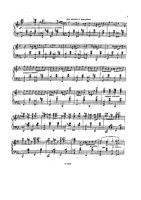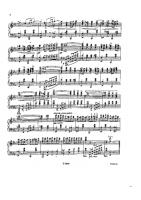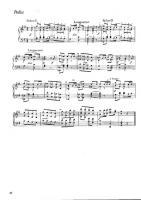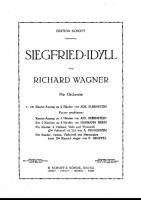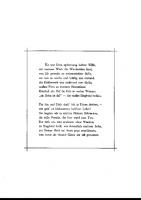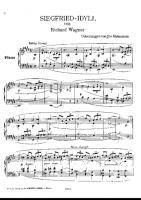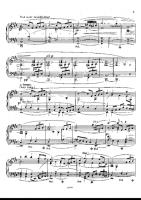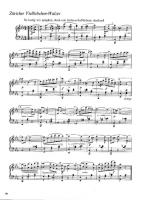Wagner Sheet Music
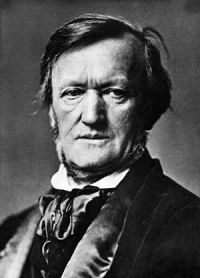 Wilhelm Richard Wagner (22 May 1813, Leipzig, Germany - 13 February 1883, Venice, Italy) was a German composer, conductor, theatre director and essayist, primarily known for his operas (or "music dramas", as they were later called). Unlike most other great opera composers, Wagner wrote both the scenario and libretto for his works.
Wilhelm Richard Wagner (22 May 1813, Leipzig, Germany - 13 February 1883, Venice, Italy) was a German composer, conductor, theatre director and essayist, primarily known for his operas (or "music dramas", as they were later called). Unlike most other great opera composers, Wagner wrote both the scenario and libretto for his works.Wagner's compositions, particularly those of his later period, are notable for contrapuntal texture, rich chromaticism, harmonies and orchestration, and elaborate use of leitmotifs: musical themes associated with particular characters, locales or plot elements. Wagner pioneered advances in musical language, such as extreme chromaticism and quickly shifting tonal centres, which greatly influenced the development of European classical music.
He transformed musical thought through his idea of Gesamtkunstwerk ("total artwork"), the synthesis of all the poetic, visual, musical and dramatic arts, epitomized by his monumental four-opera cycle Der Ring des Nibelungen (1876). To try to stage these works as he imagined them, Wagner built his own opera house.
Wagner's musical style is often considered the epitome of classical music's Romantic period, due to its unprecedented exploration of emotional expression. He introduced new ideas in harmony and musical form, including extreme chromaticism. In Tristan und Isolde, he explored the limits of the traditional tonal system that gave keys and chords their identity, pointing the way to atonality in the 20th century. Some music historians date the beginning of modern classical music to the first notes of Tristan, the so-called Tristan chord.
Wagner - Evening Star Violin Sheet Music
Advertisement
Advertisement
Please right click on the download button and select "Save Target As" or "Save Link As" to download
You can share this sheet on your Twitter or Facebook account to let your friends know too!
Comments about Evening Star by Wagner
There are no comments yet
Name (required)
Email (required, will not be published)
Email (required, will not be published)
Total 0/1000 chars
Other music sheets of Wagner
Search for Free Sheet Music
You can make a search through the entire collection of sheets.
You can make a search through the entire collection of sheets.
Latest Artists
Michael J. Oczko
× 1
bijan mortazavi × 1
Giovanni Battista Pergolesi × 1
Ruggero Leoncavallo × 1
Hannes Ruch × 1
Halfdan Kjerulf × 1
Rent × 1
Richard Clayderman × 1
Loreena McKennitt × 1
Dexter3 × 1
Rick Price × 1
Erik Satie × 2
Wicked × 2
Oscar Hammerstein × 1
Wim Sonneveld × 1
John Hughes × 1
Avenue Q × 1
ABBA × 1
Aaron Yan × 1
Ismael Rivera × 1
Styx × 1
Carlos Guastavino × 1
Damien Rice × 1
Martin Kudrna × 1
Steve Nelson × 1
Backstreet Boys × 1
The Divine Comedy × 1
Count Basie × 1
Edward Grieg × 1
Franklin L. Sheppard × 1
Giuseppe Giordani × 1
An American Tail × 1
Charles Aznavour × 1
Tom Jobim × 2
Akino × 1
Bob Gaudio × 1
Journey × 1
Threepenny Opera × 1
Magnus Pålsson × 1
Leslie Bricusse × 1
Radványi Patrik × 1
Roupa Nova × 1
Eric Whitacre × 3
Augusta Mary Wakefield × 1
Emilie Autumn × 1
Kondo Yuki × 1
john powell × 2
Vytauto Kernagio × 1
Dragon Ball × 1
Reynaldo Hahn × 1
bijan mortazavi × 1
Giovanni Battista Pergolesi × 1
Ruggero Leoncavallo × 1
Hannes Ruch × 1
Halfdan Kjerulf × 1
Rent × 1
Richard Clayderman × 1
Loreena McKennitt × 1
Dexter3 × 1
Rick Price × 1
Erik Satie × 2
Wicked × 2
Oscar Hammerstein × 1
Wim Sonneveld × 1
John Hughes × 1
Avenue Q × 1
ABBA × 1
Aaron Yan × 1
Ismael Rivera × 1
Styx × 1
Carlos Guastavino × 1
Damien Rice × 1
Martin Kudrna × 1
Steve Nelson × 1
Backstreet Boys × 1
The Divine Comedy × 1
Count Basie × 1
Edward Grieg × 1
Franklin L. Sheppard × 1
Giuseppe Giordani × 1
An American Tail × 1
Charles Aznavour × 1
Tom Jobim × 2
Akino × 1
Bob Gaudio × 1
Journey × 1
Threepenny Opera × 1
Magnus Pålsson × 1
Leslie Bricusse × 1
Radványi Patrik × 1
Roupa Nova × 1
Eric Whitacre × 3
Augusta Mary Wakefield × 1
Emilie Autumn × 1
Kondo Yuki × 1
john powell × 2
Vytauto Kernagio × 1
Dragon Ball × 1
Reynaldo Hahn × 1


